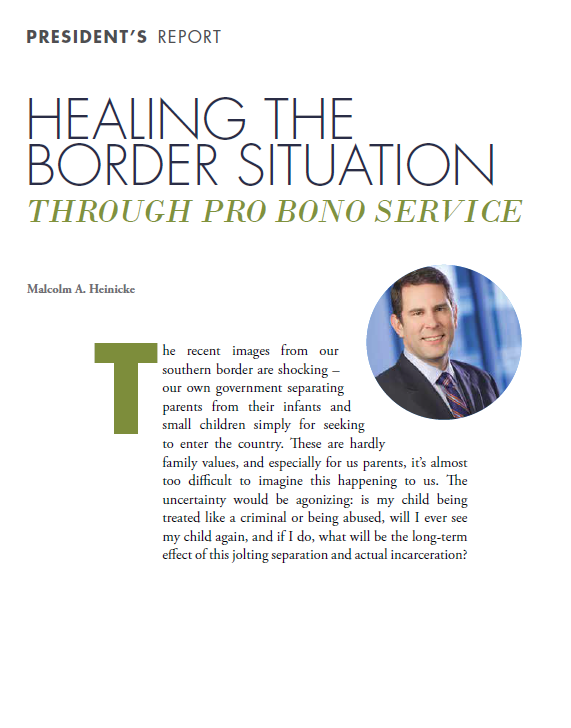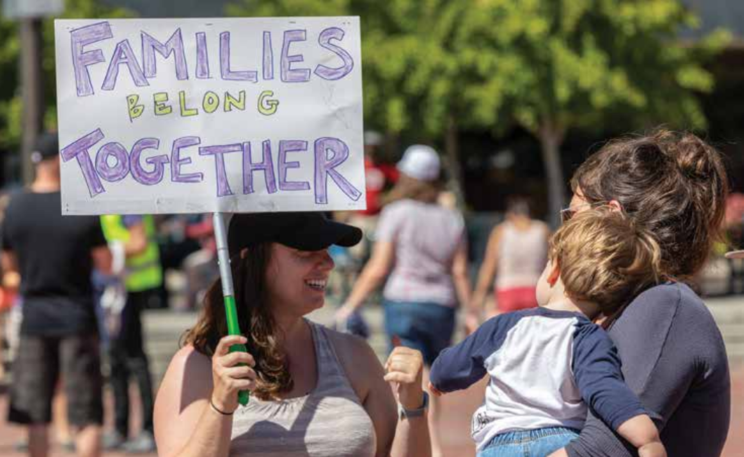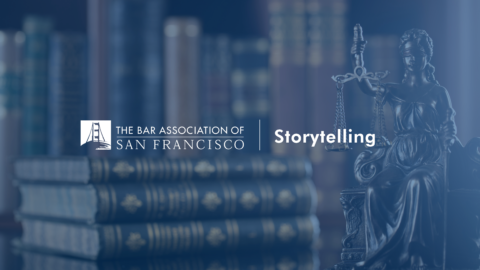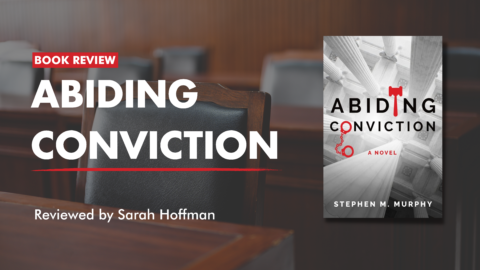
The recent images from our southern border are shocking – our own government separating parents from their infants and small children simply for seeking to enter the country. These are hardly family values, and especially for us parents, it’s almost too difficult to imagine this happening to us. The uncertainty would be agonizing: is my child being treated like a criminal or being abused, will I ever see my child again, and if I do, what will be the long-term effect of this jolting separation and actual incarceration?
The Bar Association of San Francisco (BASF) responded by condemning this practice, and the Justice & Diversity Center’s (JDC) Immigrant Legal Defense Program has long been fighting for due process rights and access to justice for immigrants throughout Northern California.
In addition, JDC provides technical expertise and capacity building, data collection and analysis, as well as advocacy. JDC does this work as a proud partner with the organizations that make up the San Francisco Immigrant Legal Defense Collaborative, the Northern California Collaborative for Immigrant Justice, and the Northern California Rapid Response & Immigrant Defense Network. Currently, JDC has a team of eight attorneys and coordinators on staff committed to protecting immigrant rights, and your support of JDC makes this possible.
But I want to be clear that those of you who do not practice immigration law can play a role too. As JDC Director Gloria Chun and I go around the city promoting JDC’s pro bono services, lawyers frequently comment on the tragic situation at the border and ask how they can channel their anger into action. Of course, a few among us went to the border and provided direct assistance, but you need not do this to make a true difference here. Just as affected parents and children will need help healing the separation scars suffered by this terrible policy, help is also needed to repair the trust of our immigrant communities and, really, our national standing.
As I wrote in my last column, JDC has ready-made volunteer opportunities to assist in preventing evictions, combating domestic violence, and stopping unfair debt collection practices. And, in taking on these efforts, our volunteers very frequently serve immigrant communities. Make no mistake, the scars that have been created are deep, but every time a volunteer lawyer provides an immigrant with representation and the associated chance at justice, it helps the healing process. It helps rebuild trust in the legal system. And just as important, it reminds people of the true values of this country and sends the message that we care about immigrants.
Your bar association is not stopping there. For those members who want to volunteer to handle immigration matters specifically, we will facilitate that too.
Attorney of the Day Program (AOD)
For lawyers with immigration law experience, we have the AOD program at the San Francisco Immigration Court. Through this program, volunteer lawyers provide counseling and same-day representation to individuals in non-detained removal proceedings before the San Francisco Immigration Court. In addition, there are opportunities for volunteer interpreters fluent in Spanish and English. A volunteer shift involves spending approximately two to three hours at the San Francisco Immigration Court to interpret during AOD’s free consultations with unrepresented respondents. To learn more, please contact AOD@sfbar.org.
In addition, we have coordinated with several partner organizations to build pathways for pro bono opportunities for lawyers with no immigration experience:
Kids in Need of Legal Defense (KIND)
Through KIND, volunteers provide legal counsel to unaccompanied refugee and immigrant children in the United States. KIND protects unaccompanied children who enter the US immigration system alone and strives to ensure that no such child appears in immigration court without representation. Immigration experience is not required, and training will be provided. Imagine the healing that winning just one child asylum case would bring. If this interests you, please contact Katie Annand at kannand@supportkind.org.
Legal Services for Children (LSC)
LSC has been serving unaccompanied children detained in custody in Northern California for many years. Attorneys interested in taking on pro bono cases to help detained children are asked to fill out an application (available at www.lsc-sf.org/get-involved/pro-bono-panel) and will then receive case summary emails immediately. Once again, attorneys of all backgrounds are needed. No immigration experience is required, and LSC will provide training. Contact Andrea Del Pan at ProBono@lsc-sf.org.
Lawyers Committee for Civil Rights (LCCR)
Since 1983, LCCR’s Asylum Program has provided legal representation for refugees who have escaped persecution and torture in their native countries. LCCR offers workshops, trainings, and other support to guide and inform each pro bono attorney who does asylum work to ensure they are fully equipped to meet the needs of the client. Further, each pro bono attorney is paired with an immigration practitioner who mentors the pro bono attorney throughout the asylum process. Through these support structures, attorneys who have had little or no immigration law experience are able to successfully take an asylum case from beginning to end. Contact: Elisa Piana at edellapiana@lccr.org.
More generally, we will work to facilitate a workshop for our members where you can hear from these and other legal services providers to determine which opportunity would be best for you. Please visit our resource page at www.sfbar.org/immigration/resources.aspx, which we update as new volunteer opportunities become available.
Please allow me to close on a personal note and explain why this issue is particularly meaningful to me. As I noted in my installation speech, I am a first generation American. My father emigrated as a ten-year-old boy (not an infant), but the thought of him being separated from his mother immediately following their already harrowing escape from Germany is hard to imagine. Once he was here, this country and his community members embraced him, and he went on to an amazing career as a child psychologist and pioneer in the mother-infant attachment field. If he were still alive, I am certain that he would be mortified, not only as a citizen but also as a scientist, about what happened at the border recently. But then, as a practitioner, he would tell us it is time to heal.
As lawyers, we too should have our own professional outrage, and I hope the ideas above will help some of you channel your personal anger into professional healing because respect for the law and one another is surely the best prescription here.
I remain very proud to be a San Francisco lawyer.
About the author:
Malcolm A. Heinicke is the 2018 president of the Bar Association of San Francisco. A partner at Munger, Tolles & Olson, his practice focuses on employment and complex commercial litigation, particularly in class and collective actions and employee mobility matters.




